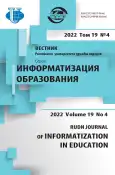The features of game mechanics use in teaching computer science for the development of creative thinking of students
- Authors: Mikhlyakova E.A.1, Starkova E.K.2, Batakova E.L.3
-
Affiliations:
- Municipal Treasury Educational Institution Secondary School with In-Depth Study of Individual Subjects of Stulovo Village
- Mendeleev University of Chemical Technology of Russia
- Municipal Autonomous Educational Institution “NewTon”
- Issue: Vol 19, No 4 (2022)
- Pages: 340-350
- Section: EVOLUTION OF TEACHING AND LEARNING THROUGH TECHNOLOGY
- URL: https://journal-vniispk.ru/2312-8631/article/view/321297
- DOI: https://doi.org/10.22363/2312-8631-2022-19-4-340-350
- ID: 321297
Cite item
Full Text
Abstract
Problem statement. One of the priority tasks of modern society is the creation of conditions conducive to the upbringing and development of a creative personality. The computer science course has a didactic potential in terms of the formation of initiative, independence, imagination, the ability to set and solve problems. The presented study aimed at substantiating the effectiveness of game mechanics use in teaching computer science to solve the problem associated with the need to develop the creative thinking of students. Methodology . The mechanics “Achievement,” “Reckoning on trust,” “Fun once - always fun,” “User progress” are implemented with game elements and methods in the study of theoretical computer science. Resources of digital services (interactive whiteboards, random selection generators) are used for gamification. The base of the experiment is a secondary school with in-depth study of individual subjects in the Stulovo village (Slobodskoy district, Kirov region). The study covered 74 students of the seventh grade (64% - girls and 36% - boys). The average age of the respondents is 13 years. Statistical processing of the results was performed using Pearson's chi-squared test. Results. During the game, students study theoretical material, solve a system of creative and non-standard tasks on the topic “Measurement of information.” For each game mechanic, a goal, tasks, sets of rules and restrictions are defined. Statistically significant differences in the qualitative changes that have taken place in the system according to the levels of development of creative thinking are identified. Conclusion . The features of the presented version of the application of game mechanics in teaching computer science in terms of the development of creative thinking are described: taking into account the age characteristics of students when formulating message texts, inclusion of digital services, combination of oral and written speech with interaction on a computer network.
About the authors
Elena A. Mikhlyakova
Municipal Treasury Educational Institution Secondary School with In-Depth Study of Individual Subjects of Stulovo Village
Author for correspondence.
Email: tutor.stulovo@gmail.com
ORCID iD: 0000-0003-4659-7255
Deputy Academic Director, computer science teacher
33 Traktovaya St, Slobodskoy district, Kirov, 613112, Russian FederationEkaterina K. Starkova
Mendeleev University of Chemical Technology of Russia
Email: starkova.kate@mail.ru
ORCID iD: 0000-0001-8613-9430
teacher, Department of Foreign Languages
9 Miusskaya Ploshchad', Moscow, 125047, Russian FederationEvgeniy L. Batakova
Municipal Autonomous Educational Institution “NewTon”
Email: hermanny@mail.ru
ORCID iD: 0000-0002-9466-5702
computer science teacher
1 Alekseya Kiryanova St, Chaikovsky, 617762, Russian FederationReferences
- Halpern DF. Teaching for critical thinking: helping college students develop the skills and dispositions of a critical thinker. New Directions for Teaching and Learning. 1999;(80):69-74. http://doi.org/10.1002/TL.8005
- Fazylzianova GI, Sokolova ТYu, Balalov VV. Gamification trends in educational communications in a digital society. Economic and Social Research. 2021;(1):105-110. http://doi.org/10.24151/2409-1073-2021-1-105-110
- Isupova NI, Suvorova ТN. Gamification of the educational process using the “flipped classroom” technology. Perspectives of Science and Education. 2019;(5):412-427. http://doi.org/10.32744/pse.2019.5.29
- Soboleva EV, Suvorova TN, Bocharov MI, Bocharova TI. Development of the personalized model of teaching mathematics by means of interactive short stories to improve the quality of educational results of schoolchildren. European Journal of Contemporary Education. 2022;11(1):241-257. http://doi.org/10.13187/ejced.2022.1.241
- Suyundikova MK, Zhumataeva EO, Suyundikov MM, Snopkova EI. Prerequisites defining the trajectory of creative thinking. Education and Science Journal. 2021;23(3):75-100. http://doi.org/10.17853/1994-5639-2021-3-75-100
- Muhammadiyeva H, Mahkamova DK, Valiyeva S, Tojiboyev IU. The role of critical thinking in developing speaking skills. International Journal on Integrated Education. 2020;3(1):62-64. http://doi.org/10.31149/ijie.v3i1.273
- Dichev Ch, Dicheva D. Gamifying education: what is known, what is believed and what remains uncertain: a critical review. International Journal of Educational Technology in Higher Education. 2017;14:9. http://doi.org/10.1186/s41239-017-0042-5
- Dyson S, Chang Y, Chen H-Ch, Hsiung H-Yu, Tseng Ch-Ch, Chang J-H. The effect of tabletop role-playing games on the creative potential and emotional creativity of Taiwanese college students. Thinking Skills and Creativity. 2016;(19):88-96. http://doi.org/10.1016/j.tsc.2015.10.004
- Hamada M, Hassan M. An interactive learning environment for information and communication theory. Eurasia Journal of Mathematics Science and Technology Education. 2017;13(1):35-59. http://doi.org/10.12973/eurasia.2017.00603
- Cakiroglu U, Basibuyuk B, Guler M, Atabay M, Memis BY. Gamifying an ICT course: influences on engagement and academic performance. Computers in Human Behavior. 2017;69:98-107. http://doi.org/10.1016/j.chb.2016.12.018
- Sergeeva ОV. Development of research computer game: how new ontology helps to cope with the methodological challenges in sociology. Sociology of Science and Technology. 2021;12(3):171-184. http://doi.org/10.24412/2079-0910-2021-3-171-184
- Vekua NN, Lubsky AA, Perevozchikova MS, Folgеrоva JuN. Peculiarities of forming high-demanded soft skills in the educational space of the escape room. Perspectives of Science and Education. 2020;(6):397-412. http://doi.org/10.32744/pse.2020.6.31
- Mauroner O. Gamification in management and other non-game contexts - understanding game elements, motivation, reward systems, and user types. Open Journal of Business and Management. 2019;7:1815-1830. http://doi.org/10.4236/ojbm.2019.74125
- Parfenova GL, Kholodkova ОG, Melnikova JuА. Complex psychological and educational support for gifted children in social and educational space: description of the model. Science for Education Today. 2019;9(6):88-105. http://doi.org/10.15293/2658-6762.1906.06
- Safonov КV, Ischukova ЕА, Zolotarev VV. Application of gamification elements in the training of students - future specialists in the field of information security. Perspectives of Science and Education. 2021;(1):450-463. http://doi.org/10.32744/pse.2021.1.31
- Guilford JP. Creativity. American Psychologist. 1950;5:444-454. http://doi.org/10.1037/h0063487
Supplementary files









